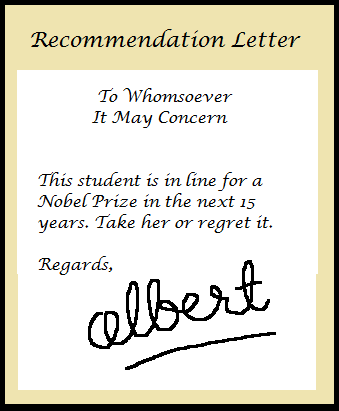 What Recommendation Letters should Cover
What Recommendation Letters should Cover
Recommendation letters should cover the following points (also see the links to great sample recos at the end of this post):
- How long the recommender has known you and in what capacity (teacher, seminar or project guide, practical supervisor, project leader etc.)
- His or her assessment of your academic performance (relative rank etc.), intellectual abilities, work habits and character
- Your special achievements – especially in projects or in papers presented
- Your communication skills – how well you were able to present your seminars
- Your social skills – ability to work well with others, leadership qualities
- Some background about the recommender – this is useful in the case of professors whose work in a field might be good but little known outside India; things to highlight include area of work, achievements in that area (papers published, awards etc.), prominent places worked in, length of experience and so on
What Gives a recommendation Letter its Weight
But what is it that makes a recommendation letter really good? One key thing is that the letter does not just give a summary of performance and qualities that tells the reader that you were a good student in class. It should back up its claims with a narration of incidents that show how you showed initiative, creativity, perseverance, intelligence, leadership or various other admirable qualities(!) in your project work, problems assigned, seminars and so on. The narration of specific evidence adds credibility to your recommender’s assertions that you are a good candidate. Check out these useful links and find out:
- What is a Good Letter of Recommendation (some simple guidelines for your recommender)
- A ‘Fill-in-the-Blanks’ Recommendation Format (an easy to use outline that can be filled in with your details just to give you the first draft of a recommendation letter for you i.e. it will give you an idea of what a recommendation letter for you would look like. Warning: lots of people will be tempted to use this draft to directly create recommendation letters for themselves. Don’t do this. Admissions Committees at the university you are applying for will spot the similarities, and when that happens your recommendation letters will become effectively useless. So, ask your recommender to get creative and draft his own letter, crafting it to as uniquely as possible for your specific case. See these excellent guidelines for recommenders by Shriram Krishnamurti, a professor of computer science at Brown university – specially important for excellent students)
- Some Basic Sample Letters of Recommendation (same advantages and warnings as above)
- Good Sample Recommendation Letters from Penn State University (note these are ‘ideal’ letters from very non-engineering field. So, you won’t be able to use them directly, but they will give you an excellent idea of what great recommendation letters look like)
Some Practical Pointers
If you include the letter in your application packet, it must be sealed and signed by the person who gave it to you. Nowadays however, universities are increasingly asking recommenders to submit their recommendation letters online .
One final word about recommendation letters: remember that writing a recommendation letter is a lot of work for a teacher or a superior at work to do for you. Apart from drafting the letter they will also have to take care of a lot of little details like sealing and signing the envelopes or uploading the letter on to the university site. When they have to do that for 8-10 different universities, all those little details pile up. Keep good relations with them and give them the motivation to write persuasively and well on your behalf! (For an interesting insight into the problems of handling online recommendation letter submissions see what Joe Schall of Penn State has to say here)
Related Links:
